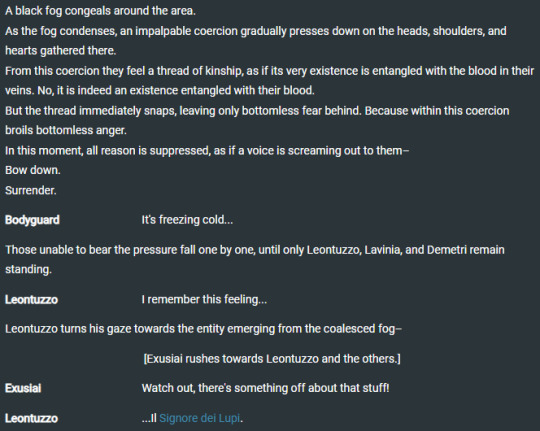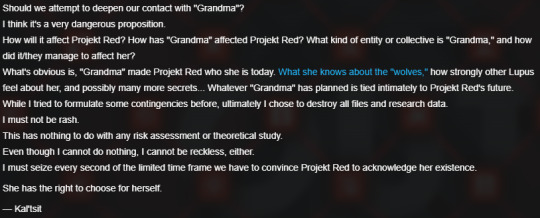#gertrude rome
Explore tagged Tumblr posts
Text
Carl : if you were to die , what would be your last words be ?
Rook : I love you <3
Ace : *rolls eyes*
Kalim : aw mine too
Gert : what about you , yuu?
Yuu : finally .
Ace : No .
#gossipduo#twst#carl lancelot#gertrude rome#twisted wonderland#twst oc#twst ace#twst rook#twst incorrect quotes#twst kalim
38 notes
·
View notes
Text
Carl is from a really rich family, which means he never learned how to cook since they have private chefs. And then there's Gert who has 0 knowlage about cooking human food.
So when culinary crucible comes, Carl is chosen to be one of the judges, along with Leona and Jade. The chef? Gert and Lilia.
Lilia is out here teaching Gert how to "cook" and Gert is just trusting his upperclass man and the ghost can't do anything about it.
When it's finally time to serve and the door open, a purple smoke came out and a strange smell. Carl tried to stand up from his seat but was forced to sit down.
After that, Carl made sure Gert was the top topic of drama they released on the newspaper club
[•~•~•~•~•]
@aster-luna-light @fools-ramblings-and-whatnot
#twisted wonderland#twst#carl lancelot#gertrude rome#lilia vanrouge#leona kingscholar#jade leech#twst oc#gossipduo
35 notes
·
View notes
Text
Thanks to @inseparabiles here are some thoughts about Web!Macrinus
Became an avatar of the web after he freed himself from his slavery, using the power to gather fighters and release them to the Colosseum in ancient Rome.
Over years he's been able to live on by sacrificing more and more fighters, stealing the very life from them.
He's moved all over Europe and northern Africa, learning any language he comes across with ease by immersing himself in the city life.
He takes great joy in controlling the choices of people to lead them into different fates, but ultimately it's the thrill of fighting that always draws him back. Underground fight clubs are typically where he is found.
By the 1800s he found himself running an infamous fighting ring in London's underground. Building a drug empire on the backside of it.
He seeks Jonah Magnus when some of the best fighters he'd seen had been taken to a strange new prison, which had collapsed and killed everyone inside, and then had an educational institution built on top of it.
It was very easy to identify the servant of the Eye.
Jonah and Macrinus became quick acquaintances, both trying to figure the other out so that they could use them.
Jonah wanted to steal Macrinus from the Web to serve him in his pursuit for the perfect ritual, while Macrinus was content to control Jonah to bring in more for his own interests.
As the Web likes the world just the way it is, Macrinus worked close beside Jonah to undermine a lot of his efforts, stealing potential archivists or sending away anyone bringing a statement. It was a game to him, and one that Jonah let happen.
The years progress but the game still goes on. Macrinus continued to mess with Jonah's plans every step of the way, while staying close as a dear "friend."
Until Gertrude came along and the plans began to change.
Macrinus didn't like the woman as she was hard to control and difficult to predict. And something about her and the way she was with Jonah was more interesting to watch. He liked the way she almost rebelled against him towards her end.
Macrinus keeps his mansion in Rome just as it was when he first acquired it, though it has been upgraded with the times and maintained by a very, very loyal staff.
He also owns many grape orchards across the continent, and one in the USA as well. Good wine became his passion as well as his one love. His brand is called "Sangue del Colosseo" Blood of the Colosseum. It's primarily red wines but started to make some whites into the end of the 20th century.
Jonah was always the first to test a new wine, a tradition they still uphold into the modern day, going so far as to make it a monthly taste testing of all sorts of wines, not just Macrinus's own.
The one thing Macrinus loves is to drive people to fight. He pulls out their secrets, their insecurities, their shame, and uses it like a leash to keep control over them.
#opal beeps and creaks#the magnus archives#gladiator 2#web!macrinus#jonah magnus#macrinus#gladiator 2 macrinus#tma au#right now i just have thoughts#but the two of them together is just so interesting
7 notes
·
View notes
Text
Projekt Red: Desire for connection and her relationship with Kal'tsit and Grandma.
So originally this was going to just be about Red's relationship with Kal'tsit but thinking about it, I decided I wanted to discuss many other facets of Red when it comes to her connections with other people.
But without further ado:
Setting the scene.
Firstly I want to discuss the possible themes of family and accompanying themes for Siracusa and particularly Lupos.
Nothing illustrates it better than the founding story of Siracusa: the story of the She-Wolf, which takes inspiration from Rome's founding story of Romulus and Remus. A story that ends with Romulus killing his brother Remus, which I say for a reason.
From Rewinding Breeze's Stories from the Sky, it goes as such:

I want to specifically point out the final line of this cropped version: "From then on, Lupos stopped separating themselves into tribes, and called each other family instead."
The story of the She-Wolf and founding of Siracusa is specifically connected to family and Lupos and I think that the state of the She-Wolf's family is echoed in other Lupo's families. Maybe not purposefully but the inversion of wolves, known for their packs is what I imagine they're going for.
But to call attention to Lupos with strained families or connected to lonliness:
Texas's Father killed her Grandfather, leading to the destruction of the Texas family which she herself just watched, tired of it all and before meeting Emperor was alone thereafter.
Lappland hates her Father more than anything else but Siracusa, with her cutting ties with him entirely after Il Siracusano and him vowing to kill her if they meet again. Also due to her exile she's described as a Lone Wolf.
The Bellone family falls apart in Il Siracusano, with several betrayals and rifts caused throughout the event.
Capone and Gambino, once sworn brothers, become enemies in Code of Brawl.
Gertrude suffered abuse from her father and killed her brother, living and dying alone thereafter.
Pozyomka's whole family was murdered right in front of her, leading to her distrusting the surface and fleeing alone till finding a home with the Durin, though with undeniable differences between them.
Horn is implied to dislike her Father's action but her story following Episode 9, wherein she loses her whole squad but Bagpipe, became Dublinn's prisoner and survived alone in Londinium's sewers with only Metal Crabs as company hones in more on the loneliness.
Crownslayer's parents dying in the Chernobog sarcophagus purge. Reunion falling and then Red killing her mentor, leaving her with no one.
But there's one I left out in this for the sake of focusing on it.
Kinship.

This is Red's Trust 1 and 2 voicelines, Both portray her loneliness and call to two different things. I'll get onto her Trust 2 in a bit but for Red's Trust 1, it shows that whereas where other Lupos or Siracusans have turmoil with their families, either having them be strained, broken or dead, Red doesn't have a family.
Now, it is mentioned in Red's file 4 the existence of someone called Grandma who is responsible for why Red is the way she is, having been the one to raise her, uh, "raise her" before Kal'tsit.
Il Siracusano reveals the existence of beings known as the Signore dei Lupi who are Lupine Beast Lords like Emperor or Gawain and revealing that Grandma is one of them as well as what she expects from Red. Basically, the Signore dei Lupi each have a Fang that they train to kill the other Signore dei Lupi's Fangs. Red is Grandma's Fang.
The Signore dei Lupi claim territory in the wastes of Siracusa. Red's module confirms that this is where Red was trained in the least but as Il Siracusano introduces Lunacub, another Fang who only knows the wilderness and has no family like Red, it can be inferred that Red too was raised away from society, in the wilderness only knowing Grandma.
But even with Lunacub sharing almost the same upbringing that Red did there's a profound difference in how they were raised by their respective Signore dei Lupi. One that results in Lunacub being more capable and sociable than Red.


As said, Red has many problems. She's stated to have both educational as well as social problems. She cuts anything that gets close to her. I believe that her speech is broken (more evident in CN text if I'm right). And has limited empathy.
And as illustrated by her Trust 2:

She has a yearning to bond with other Lupos specifically it appears from this and her module which includes a ball made of fur specifically mentioned to be for when there's no Lupo tails to touch. Which, her wanting to bond with others would make sense.
There's a theme with Red's Trust lines where each line she doesn't take a hard stance on, moreso questioning or confused by something whether it's the importance of family, why she's being avoided or what her life could've been if she wasn't a Wolf Hunter i.e. met Grandma.
The final line of her Trust 3 is the Doctor asking Red to answer the question herself, which I think calls back to her module that really hammers in that Red struggles thinking for herself:

Something that Kal'tsit recognizes and points out herself:

So I see Red's Trust lines as her not being able to understand what she's feeling, the best she can do is to question things that she has feelings about deep down or have deeper meaning to her that she's not aware of.
Being that if she wasn't a Wolf Hunter she could have lived a happier life. She maybe would've had a family of her own. Could approach and befriend other Lupos. Have a bond with others, something that she can't at the moment.
I feel that Red's targeting of Lupos in her Trust 2 is for sure because of Siracusa's emphasis on Lupos and between the She-Wolf & her children and the Signore dei Lupi there is an emphasis on Wolves sticking together.
There's also something specifically with Red, cause the Signore dei Lupi as far as we've seen only have Lupos as their Fangs which on top of the emphasis on Lupos and wolf packs actually goes a level deeper due to two points:



I made a whole post about this but basically: Zaaro demonstrates the same or near identical ability as Red scaring Lupos and Vigil describes it as "kinship" and in the second and third images through Ho'olheyak we learn that Kukulkans and likely all Ancients were originally actual creatures.
So Lupos likely were originally actual Wolves, with the Signore dei Lupi or rather Lupine Beast Lords were kin with in some way or another and able to exert power over them through kinship, like Zaaro demonstrates in that image.
But also likely what Red is doing to scare Lupos, which is tragic. She wants kinship with her fellow Lupos but if I'm correct with this, then unbeknownst to her she has stronger kinship with them than any other Lupo and it's exactly why they're terrified of her.
Also a side note, I do wonder if in IS-ST-4 Red sees Crownslayer as someone she's somewhat fine with and if it's a result of Crownslayer being a Lupo by her account.
Cause there's "Is she your Kal'tsit?" which I'll delve into, but her expression is a happy one as opposed to her resting one for the rest of the conversation and in general she feels too casual.
But that's just a thought. Now, onto the next part:
Grandma and Kal'tsit.



"I do as Grandma/Kal'tsit says"
It's the exact same thing for both of them and by all means it should be. Grandma and Kal'tsit are the people who raised Red, albeit one better than the other.
With the minimal knowledge that Kal'tsit has about Grandma she suspects her to be responsible for the problems Red has that Rhodes has laid out in her files:

As I showed before, Grandma only taught Red what Grandma deemed Red would need to know to accomplish what Grandma wanted before throwing her into a traumatic experience and then doing it again:

And as the end of that paragraph, the way that Grandma raised Red, what she threw her into again and again would have killed her in some way if it wasn't for Kal'tsit.
Now, this is where our information about Grandma dries up as she's not mentioned in Il Siracusano outside of that one screenshot and we don't yet know how Kal'tsit met Red but what we do know is what Kal'tsit did upon meeting her:



Kal'tsit saw the problems that Red has and like Rosmontis, probably recognized how severe they were and decided to provide her with shelter in exchange for Red aiding Rhodes Island through her combat skills.
We also know that Rhodes Island put Red through several tests, likely headed by Kal'tsit herself who we also know tried coming up with several contingencies before scrapping them, destroying test data and classifying a lot of information regarding Red because of the severity and delicate nature of her situation.


But while there's nothing that she can do and by extension Rhodes, she still tries to help Red, whether by teaching her outright like the homework she gets her to do or by teaching her moral lessons which I believe she does in 6-11 after Crownslayer leaves.
Kal'tsit puts in a lot of effort to help Red which really contrasts Grandma's lack of care or affection or help. If Grandma had done much of anything then Red wouldn't have the problems she does, she like Lunacub could've known care and affection and end up better because of it.
But Red, the awful experiences she's gone through, how even now she struggles and doesn't know how to do a lot of things and yearns for affection from other Lupos, is because of how Grandma raised her.
And now Kal'tsit is doing her best to help Red, despite likely knowing that Red will one day leave and that Kal'tsit can't do much to help her and that it's up to Red to help herself at the end of the day. She put in a lot of effort for her.
How Red feels about Kal'tsit on the other hand I feel is quite complicated.
A lot of the time when Red talks or thinks about Kal'tsit it's what Kal'tsit has done for her or their agreement. There's not anything so much resembling the worry Kal'tsit puts in for her. Which I think isn't for lack of care for Kal'tsit.
Going back to how Red says she does what Grandma says and Kal'tsit says in the same way, right?
Red struggles to think for herself. It's what her Trust lines are about. It's what Kal'tsit sees that Red needs to do in her File 4. It's what her module is about. But Red can't and it's the basis of her relationship with Grandma, which is the only one that she knew for ages.
Grandma would teach her something, expecting her to accomplish it and then Red would be thrown out to do it. Likely this repeated and Red came to rely on Grandma to know what to do and not yet having learnt to be autonomous, Red now leans on Kal'tsit in a similar way.
Red doesn't know what it's like to have a parent or a friend, she only knows a master and while I'm sure Kal'tsit tries to not have their relationship be that, Red is the one who sees it as such.
But I think like the Trust lines being Red's attempt of touching upon deeper feelings, I think Red holds that care for Kal'tsit but she knows no different than how she acted with Grandma but it comes through. In it's own way.
And here is where I leave this off because sadly the state Red is in right now isn't the most happy state but I hope you enjoyed reading. Red's got a lot of developing to do for her eventual event and I cannot wait to see what happens between her and Grandma and hopefully Kal'tsit.
I just deem their relationship as really really important and while I'm sure Red will get closer to others in her event, Kal'tsit is so important I hope it's shone some light on in the event itself or an oprec or module.
#arknights#projekt red#kal'tsit#red doesn't have an oprec yet#and I get it#the state she's in makes it pretty difficult#but at the same time#something please
40 notes
·
View notes
Text
Holidays 3.17
Holidays
Buy Women Owned Day
Camp Fire Girls Day
Children’s Day (Bangladesh)
Day of Comics & Comic Books (Spain)
Day of the Snipers
Doctor-Patient Trust Day
Ennensaii (Kyoto, Japan)
Evacuation Day (Suffolk County, MA)
Glider Day
Kustonu Diena (No Planting Day; Ancient Latvia)
Mobilization Employee Day (Ukraine)
Muckraker Day
National Children Day (Bangladesh)
National Muay Thai Day (Thailand)
National SBCD Day
National Slime Day
Patrick Star Day (SpongeBob)
Psyche Asteroid Day
Ramon Magsaysay Memorial Day (Philippines)
Rubber Band Day
Sheikh Mujibur Rahman Day (Bangladesh)
Social Care Day of Remembrance & Reflection (UK)
St. Patrick's Day (a.k.a. ...
Corned Beef & Cabbage Day
Green Ribbon Day
Irish Coffee Day
Irish Stout Day
Lá Fhéile Pádraig
St. Catrick’s Day
Submarine Day [also 4.11]
317 Day (Indiana)
Vanguard I Day
Wood Anemone Day (French Republic)
World Shale Energy Day
Food & Drink Celebrations
Irish Car Bomb Cocktail Day
Irish Coffee Day
Irish Stout Day
National Corned Beef and Cabbage Day
National Irish Beer Day
National Irish Food Day
St. Carl’s Day (Sacrilege Brewing)
World Halal Day
Nature Celebrations
Bean Flower Day (Happiness Will Definitely Come; Korean Birth Flowers)
Violet Day (Viola odorata)
World Maritime Day
Independence, Flag & Related Days
North Albania (Declared; 2009) [unrecognized]
Republic of Abrus (Declared; 2018) [unrecognized]
Republic of Texas (Constitution Adopted; 1837)
Venice Republic (Declared; 1848)
3rd Monday in March
Act Happy Day [3rd Monday]
Benito Juarez Fiestas Patrias (Mexico) [3rd Monday]
Dangerous Dan's Annual Coffee Cup Washing Day [3rd Monday]
Dribble to Work Day [3rd Monday]
Labor Day (Christmas Island) [3rd or 4th Monday]
Manic Monday [3rd Monday of Each Month]
Meatball Monday [3rd Monday of Each Month]
Meditation Monday [Every Monday]
Monday Musings [Every Monday]
Motivation Monday [Every Monday]
Wellderly Day [3rd Monday]
World Folk Tale and Fable Day [3rd Monday]
Weekly Holidays beginning March 17 (3rd Week of March)
Agricultural Week [3rd Week]
Culpeper Downtown Restaurant Week (Culpeper, Virginia) [thru 3.23]
National Wildlife Week [3rd Week]
Festivals On or Beginning March 17, 2025
New Orleans St. Patrick’s Day Parade (New Orleans, Louisiana)
NYC St. Patrick’s Day Parade (New York, New York)
Feast Days
Agricola (Christian; Saint)
Alexius of Rome (Eastern Church)
All Snakes’ Day (Church of the SubGenius)
Bacchana'lia (Festival of Bacchus; Ancient Rome)
Damballah’s Day (a.k.a. Damballay Weddo; primordial snake of life Iwa; Vodou)
Dave the Dog (Muppetism)
Feast of the Blessed Leprechaun (Church of the SubGenius)
Gertrude of Nivelles (Christian; Saint)
John Sarkander (Christian; Saint)
Joseph of Arimathea (Western Church)
Kate Greenaway (Artology)
Liberalia (Ancient Roman festival of Liber Pater)
The Martyrs of Serapeum (Christian; Martyrs)
Noah Entered the Ark Day (Middle Ages Christianity)
Patrick of Ireland (Christian; Saint) [Ireland] *
Paul of Cypress (Christian; Saint)
Shabbat HaChodesh (שַׁבָּת הַחֹדֶשׁ) [25 Adar]
St. Patrick’s Day Excuse (Pastafarian)
Tacitus (Positivist; Saint)
Trefuilnid Treochair (Feast of Triple Bearer of the Triple Key; Ireland)
Withburga (Christian; Saint)
Lunar Calendar Holidays
Chinese: Month 2 (Ji-Mao), Day 18 (Yi-You)
Day Pillar: Wood Rooster
12-Day Officers/12 Gods: Destruction Day (破 Po) [Inauspicious]
Holidays: None Known
Secular Saints Days
Sammy Baugh (Sports)
John Boyega (Entertainment)
Harry Clarke (Art)
Nat ‘King’ Cole (Music)
Billy Corgan (Music)
Danny DeVito (Entertainment)
William Gibson (Literature)
Francois Girardon (Art)
Kate Greenaway (Art; Literature)
Clare Grogan (Music)
Patrick Hamilton (Literature)
Mia Hamm (Sports)
Paul Horn (Music)
Jean Ingelow (Literature)
Bobby Jones (Sports)
Kate Ledecky (Sports)
Rob Lowe (Entertainment)
Ken Matting (Science)
Patrick McDonnell (Art)
Hans Namuth (Art)
Rudolf Nureyev (Dance)
Jean Baptiste Oudry (Art)
Gene Pitney (Music)
Lloyd Rees (Art)
Kurt Russell (Entertainment)
John Sebastian (Music)
Gary Sinise (Entertainment)
Mikhail Vrubel (Art)
Lucky & Unlucky Days
Sensho (先勝 Japan) [Good luck in the morning, bad luck in the afternoon.]
Very Unlucky Day (Grafton’s Manual of 1565) [16 of 60]
Premieres
The Agony and the Ecstasy, by Irving Stone (Novel; 1958)
Aloha Oe (Fleischer Screen Songs Cartoon; 1933)
American Hot Wax (Film; 1978)
The Animated Grouch Chaser (Barre Cartoons; 1915)
The Bastille (Paris Opera House; 1990)
Batman & Mr. Freeze: Sub-Zero (WB Animated Film; 1998)
Beezus and Ramona, by Beverly Cleary (Novel; 1955)
The Black Duck (Aesop’s Film Fable Cartoon; 1929)
Bound for Glory, by Woody Guthrie (Autobiography; 1943)
Bowery Bimbos (Oswald the Lucky Rabbit Cartoon; 1930)
Break Like the Wind, by Spinal Tap (Album; 1992)
Breathless (Film; 1960)
The Champion of Justice (Super Mouse Cartoon; 1944)
Circle of Friends (Film; 1995)
The Cop’s Bride (Aesop’s Film Fable Cartoon; 1923)
Dial “P” for Pink (Pink Panther Cartoon; 1965)
Erin Brockovich (Film; 2000)
The Fable of the Glider (Aesop’s Film Fable Cartoon; 1923)
Final Destination (Film; 2010)
Fletch Lives (Film; 1989)
Fraidy Cat (Tom & Jerry Cartoon; 1942)
Goofy and Wilbur (Mickey Mouse Disney Cartoon; 1939)
Gym Jam (Fleischer/Famous Popeye Cartoon; 1950)
I Only Have Eyes For You (Blue Ribbon Hit Parade Cartoon; 1945)
Iron Fist (TV Series; 2017)
iZombie (TV Series; 2015)
Ko-Ko’s Tattoo (Fleischer Inkwell Imps Cartoon; 1928)
Krazy Kat & Ignatz Mouse at the Circus (Hearst-Vitagraph News Pictorial Cartoon; 1916)
Le Quiet Squad (The Inspector Cartoon; 1967)
The Little Princess (Film; 1939)
The Magician’s Elephant (Animated Film; 2023)
Maiden Voyage, by Herbie Hancock (Album; 1965)
The Marvelous Mrs. Maisel (TV Series; 2017)
Minx (TV Series; 2022)
National Association of Professional Basketball Players (Sports League; 1871)
National Gallery of Art in Washington D.C. (Museum Dedicated; 1941)
Naughty Number Nine (Multiplication Rock Cartoon; Schoolhouse Rock; 1973)
Old Mother Hubbard (ComiColor Cartoon; 1935)
Patriotism (Pathe News Cartoon; 1915)
Piano Concerto No. 2 in F Minor, by Frederic Chopin (Piano Concerto; 1830)
Plane Crazy (Mickey Mouse Disney Cartoon; 1929)
Purple Haze, by Jimi Hendrix (UK Song; 1967)
Renegade, by Styx (Song; 1979)
Rock ’n’ Roll Fantasy, by Bad Company (Song; 1979)
Shazam! Fury of the Gods (Film; 2023)
Songs That Live (Sing and Be Happy / Cartoon Melodies Fleischer Cartoon; 1952)
Son of a Son of a Sailor, by Jimmy Buffet (Album; 1978)
Spring Festival (Columbia Favorites Cartoon; 1949)
The Story of Philosophy: The Lives and Opinions of the World's Greatest Philosophers, by Will Durant (Book; 1926)
Thank You for Smoking (Film; 2006)
This Year’s Model, by Elvis Costello (Album; 1978)
Traffic Troubles (Disney Cartoon; 1931)
Twenty Thousand Streets Under the Sky, by Patrick Hamilton (Novel; 1935)
V for Vendetta (Film; 2006)
William Gibson (Writerism)
William Tell, by Friedrich Schiller (Play; 1804)
With Russia from Love, by Little Big (Album; 2014)
Yakety Yak, recorded by The Coasters (Song; 1958)
Today’s Name Days
Gertraud, Gertrud, Patrick (Austria)
Domagoj, Gertruda, Hrvatin, Patricija, Patrik (Croatia)
Vlastimil (Czech Republic)
Gertrud (Denmark)
Gerda, Gertrud, Kärdi, Kärt, Kerli, Kert, Kertu, Ruta, Ruuta, Truude, Truuta (Estonia)
Kerttu, Kerttuli (Finland)
Patrice, Patrick (France)
Gertraud, Gertrud, Patrick (Germany)
Alekos, Alexios, Alexis, Gertrude (Greece)
Gertrúd, Patrik (Hungary)
Patrizio, Teodoro, Wanda, Vanda (Italy)
Gerda, Ģertrūde, Karīna (Latvia)
Gendvilas, Gertrūda, Patrikas, Varūna, Vytė (Lithuania)
Gjertrud, Trude (Norway)
Gertruda, Harasym, Jan, Patrycjusz, Patryk, Regina, Rena, Zbigniew, Zbygniew, Zbyszko (Poland)
Alexie (Romania)
Ľubica (Slovakia)
Patricio (Spain)
Gertrud (Sweden)
Oleska (Ukraine)
Paden, Pat, Patrice, Patricia, Patrick, Patsy, Patti, Patty, Trish, Trisha (USA)
Today’s National Name Days
National Rob Day
National Rudolf Day
Today is Also…
Day of Year: Day 76 of 2025; 289 days remaining in the year
ISO Week: Day 8 of Week 12 of 2025
Celtic Tree Calendar: Fearn (Alder) [Day 20 of 28]
Chinese: Month 2 (Ji-Mao), Day 18 (Yi-You)
Chinese Year of the: Snake 4723 (until February 17, 2026) [Ding-Chou]
Coptic: 8 Baramhat 1741
Druid Tree Calendar: Lime (Mar 11-20) [Day 7 of 10]
Hebrew: 17 Adar 5785
Islamic: 17 Ramadan 1446
Julian: 4 March 2025
Moon: 89%: Waning Gibbous
Positivist: 20 Aristotle (3rd Month) [Tacitus]
Runic Half Month: Beore (Birch Tree) [Day 10 of 15]
Season: Winter (Day 87 of 90)
SUn Calendar: 16 Green; Twosday [16 of 30]
Week: 3rd Week of March
Zodiac:
Tropical (Typical) Zodiac: Aquarius (Day 27 of 30)
Sidereal Zodiac: Pisces (Day 3 of 30)
Schmidt Zodiac: Capricorn (Day 24 of 27)
IAU Boundaries (Current) Zodiac: Pisces (Day 6 of 38)
IAU Boundaries (1977) Zodiac: Pisces (Day 6 of 38)
3 notes
·
View notes
Text
















„WALKÜRE“ R. Wagner / SECOND and THIRD ACT
Some Brünnhildes
Amalie Materna as Brünnhilde; Bruxelles, 1889
Pauline Mailhac as Brünnhilde; Karlsruhe, 1891
Ellen Gulbranson as Brünnhilde; Bayreuth, 1902
Lucienne Breval as Brünnhilde; Paris, ca. 1900
Anna Bahr-Mildenburg als Brünnhilde; Vienna, ca. 1900
Laure Berge as Brünnhilde; Bruxelles, ?
Elise Beuer als Brünnhilde; ?, ?
Olga Blomé as Brünnhilde; Bayreuth, 1924
Lina Boeling as Brünnhilde; ?, ?
Helena Braun as Brünnhilde; Munich, ?
Gertrud Bindernagel as Brünnhilde; ?, ?
Berthe Briffaux as Brünnhilde; Antwerpen, 1932
Lotte Burck as Brünnhilde; Milan, 1932
Sara Cesar as Brünnhilde; Rome, 1920
Sofie Cordes-Palm as Brünnhilde; ?, ?
Erna Denera as Brünnhilde; Berlin, ?
#classical music#opera#music history#bel canto#composer#classical composer#aria#classical studies#maestro#chest voice#Die Walküre#The Valkyrie#Richard Wagner#Wagner#Der Ring des Nibelungen#The Ring of the Nibelung#Norse mythology#Völsunga saga#Poetic Edda#classical musician#classical mythology#classical musicians#classical voice#classical history#history of music#historian of music#musician#musicians#music education#music theory
35 notes
·
View notes
Note
Do you have any opinions on ’Inside the Tudor court’ by Lauren Mackay about Eustace Chaupys? I liked it a lot but the bootlicking the author has for him is almost painful
✨ terfs/zionists fuck off ✨
i generally agree with you. i think the book is overall fine for an overview of chapuys’ career, but i think mackay does sometimes approach his dispatches with too much credulity. i don’t tend to always agree with her conclusions.
chapuys could be mistaken — he frequently was — and his judgements clouded his veracity. his accounts of anne boleyn are the most obvious example: mackay claimed “at one point anne herself had even boasted that she would force mary to serve in her household, or marry her to some varlet, a mere servant boy” — but did she? chapuys’ only reported that she did, and the fact that these claims did not happen suggests he was wrong or missing information. he frequently overreached and alienated himself. i think mackay could have gone further in engaging with the limitations in chapuys as a primary source — who was feeding him information, for what purpose, and how was chapuys, in turn, relaying it? sometimes she does good work on this regard, but it is inconsistent.
take her assessment of chapuy’s dispatches about jane seymour, for example. mackay claims “jane was a rallying point and a popular one with the conservative faction” — yet the idea of a conservative ‘faction’ is not entirely substantiated. “while it is not difficult to list some noblemen and noblewomen and some courtiers who were indeed critical of the break with rome and of the treatment of catherine of aragon and princess mary, it is much harder to find any evidence first that they acted as a coherent political group” (bernard), and little really supports an idea of jane’s particular significance in bringing down anne boleyn. certainly, on the 28th april 1536, chapuys reported that “[carew] continually counsels mrs. semel and other conspirators”, directly naming jane as a ‘conspirator’, but this might be worth reconsideration. as bernard has pointed out:
“on the same day as he wrote this to charles v, chapuys also wrote to cardinal granvelle saying that he had nothing of importance to write. was chapuys sceptical of the gossip that it was his duty to report? and the date of the letter is important too. when chapuys wrote, anne was apparently already under investigation. this letter cannot therefore be taken as proof that there had been a long-term conspiracy”.
that is a lot of emphasis on one comment by chapuys — his letter is “thus being made to bear a very heavy weight of factional interpretation” (bernard) — and while this may not be the correct interpretation, it certainly evidences the lack of deeper analysis done by mackay when considering the veracity of chapuys’ reports. it certainly seems worth acknowledging that chapuys took some credit for anne’s fall. mackey accepts this, writing that “on 2 may 1536, he wrote that mary had encouraged him to get rid of anne and, on her advice, he employed various means to do so […] as we have seen, chapuys did encourage the nobility […] to oppose anne”, and while it is true that he met and spoke with cromwell, gertrude courtenay, and others… it seems a considerable overestimation of the influence of the same man that mackay had, earlier in her book, admitted that by early 1536, “had very few friends. even those he considered as confidants answered to a higher power and served a higher agenda”. likewise, it seems odd to me that chapuys should be entirely believed for claiming he “used several means to promote the matter”, when his previous dispatches, pleasing for mary to flee england, or for charles to invade, were unconvincing/unsuccessful. if chapuys was so involved and influential… would he not have a fuller account of jane seymour?his report of her was so impersonal that it seems he barely knew her, and if she was the popular ‘rallying point’ of the campaign against anne, as mackay claimed she was, surely chapuys would have had more information on her?
to be fair, this borders on nitpicking. i do like her book as an overview. more generally, i will say though that i lost a bit of respect for her work following her involvement in blood, sex and royalty, owing to some of her contributions being ridiculous.

apparently people sent her and others abuse over this doc, which is pathetic behaviour… however, i do think that documentary was worthy of (qualified, respectful) criticism. i think if you say things that are wrong, you should be told you are wrong. i mention this because i think it’s fair to, considering i’ve criticised others for similar comments in the same documentary, and because mackay has a tendency for being Online and has tweeted about tumblr blogs before and i think that can misrepresent criticism as ‘hate’.
3 notes
·
View notes
Text
3 notes
·
View notes
Text
Diversity Contemporary II
I am beyond thrilled to be participating at Diversity Contemporary II, Rossocinabro Gallery, Rome, Italy,10 December 2024 – 31 January 2025.
Read the curator Joe Hanson introduction:
”This exhibition celebrates artistic diversity and cultural interconnectedness, transcending geographical and stylistic boundaries.
Born from a desire to make a selection of artworks accessible to the public, many of which have never been exhibited or only for brief periods, this show offers a unique opportunity to discover hidden treasures and admire the richness and variety of contemporary artistic production.
Through this exhibition, Rossocinabro reaffirms its commitment to internationalization, a path it has been following since its early years. The aim is to build a bridge between artists from different cultures and to offer the public an increasingly rich and varied artistic experience.”
read more: Diversity Contemporary II, Rossocinabro Gallery, Rome, Italy,10 December 2024 – 31 January 2025.
Participating artists:
Elaine Asarch, Charlotte Baqai, Helene Brinzas, Lorraine Brown-Glessner, Patricia Canino, Alain Churlaud, Manolis Drosakis, Elisa Friman, Tamara Jare, Christine Kingerski, Rebeccah Klodt, Michael Lin, Hanna Liubinskaya, Fiona Livingstone, Gertrude Lozeau, Marcus Luconi, Sandra Meyer, Bobby Austin Mombray, Gerti Papesch, Mages Peter, Lin Pin, Gayle Printz, Giulia Rizzotti, Rosalorenza, Roger Schultz, Milos Sejn, Miyako Shimizu, Eleftheria Sifnaiou, Anne Swift, Tamara Sweere, Josefina Temin, Zahra Tharan
We look forward to welcoming you from Monday to Friday, from 11 am to 5pm

#art#tamarajare#painting#contemporaryart#artcollector#artwork#oilpainting#canvas#painter#artists on tumblr#art exhibit#curated exhibition#public exhibition#art exhibition#exhibition#gallery#arte#artists#art blog#art detail#contemporary art#european art#fine art#history of art#italian artist#modern art#realist art#women artists#women in art#my art
2 notes
·
View notes
Text
How Is It that the Clouds Still Hang on You
Bridgertons performing Hamlet, part one! This wouldn't have been possible without @glintglimmergleam!
Pre-play, Anthony’s Hamlet is the eternal student, the idle rich somewhere between seventeen and thirty who still doesn’t know what he wants to be when he grows up. First sons really only have one job, and that’s to someday be their fathers; and Hamlet, like Anthony, is sure he’s getting it wrong no matter what he does. Anthony at least has the estate and his younger siblings to look after, but Hamlet only has the vague notion of someday being king, and looking through the script for hints of who Hamlet used to be, Anthony thinks for the first time that the prince must have been lonely even before his father died.
His only recourse was to take nothing seriously and sell himself as the clown of any group, and he usually managed to believe what he was selling and even enjoy himself. When Claudius popped in between the election and his hopes, those hopes curdled inside of him and he started putting up firmer, spikier walls, where before there was only wordplay and multi-layered classics references. (Anthony is actually hopeless at this kind of thing; he had to ask Benedict about “When Roscius was an actor in Rome” and “Jephthah, judge of Israel, what a treasure hadst thou!” but what was he going to do, not make Hamlet a classics nerd??)
Gregory memorizes the roles with the most lines first, of course, so he’s already gotten the bantering rhythm down for playing both halves of a comedy duo attempting to be spies. “My lord, you once did love me” is regret for the distance in age with his oldest brother, and the distance in social status for Rosencrantz and Hamlet. Osric, he unlocks when he decides this vain and silly courtier idolizes both Laertes and Hamlet in much the same way that Gregory looks up to his oldest brothers, so he and Benedict talk about it and come to the conclusion that Laertes might trust Osric enough to ask him to help kill Hamlet, but Osric would never go along with it, which means that in this production Laertes didn’t tell him what he was getting Hamlet into.
Now he has to bring the soldiers on the watchtower to life. He whirls as if to face an unexpected noise, and answers himself rapid-fire.
— Who’s there! — Nay, answer me. Stand and unfold thyself! — Long live the king! — Barnardo? — He.
It’s almost a knock-knock joke but the truth is that no one in this play really knows who’s there or if they can be trusted, and it’s an uncertainty hidden in plain sight right from the opening lines. For this dialogue to work, it has to be two people meeting in the dark and he can’t just play both roles like he does for Ros and Guil.
“Hey, Daphne, my favorite sister, how would you like the second speaking role in Hamlet?”
“Hold still, your collar’s askew, I need to fix it. Only the second role?” she asks. “Not the first?”
“Daaaph, cut it out, my shirt is fine! And Barnardo can pretty much be combined with Marcellus and not much will change because they’re both there to back up Horatio’s story, and he’s there to back up theirs. Francisco’s more like Gertrude, he never gets to see the ghost.”
“Not a mouse stirring,” she quotes. “But he’s wrong about that and so is the queen — there’s so much more stirring in her kingdom than she’ll allow herself to see. Yes, I think you’re right about giving me Francisco. You’ll make a good director for next year’s play.”
“Titus Andronicus?” he asks with a bloodthirsty grin.
“Well, we’ll talk about it.”
At first Francesca has trouble deciding how to distinguish Claudius from his dead brother — are they more alike or more different? No face paint for the ghost, she decides, and in fact they should have almost the exact same costume with perhaps a different colored sash, and it’ll depend on how she carries herself.
Claudius is personable and popular except when he’s alone and the thought of his own sin wraps around his neck, while King Hamlet has forgotten everything but the purgation of his sins, and the vengeance he must see visited on his killer before he may rest. The ghost is not all there, still half in the fires of hell, but he also has a supernatural gravity that snaps all the attention in a room to him. It’s a kind of authority Claudius wishes he could project, but as good at public speaking as he is, he always seems a little bit desperate and out of his depth, so he turns up the charm even more.
Francesca finds what they have in common, too, more than either would care to admit. “Of life, of crown, of queen, at once dispatched” says one; “my crown, mine own ambition, and my queen,” says the other. Both kings save Gertrude for last, which could either mean that she’s an afterthought or that she was the most important thing to lose or gain.
Francesca is a Bridgerton which means she’s a romantic, so she decides it’s the latter. They both just really love their wife, enough to kill a man, enough to tell Hamlet not to contrive against his mother aught, enough to come back from the dead for a few more moments in her bedchamber, enough to send Hamlet away to be executed in England instead of imprisoned in Denmark simply because Gertrude asked.
By the time Claudius gives his speech about marrying Gertrude, Hamlet has a permanent clench to his jaw whenever he’s in public or in the same room as Claudius — that shouldn’t be too hard, says Eloise, since that’s his default expression, and Benedict, who’s probably seen Anthony laugh more than anyone else, has to agree with her. But when he’s left alone, though forbidden to go to Wittenberg, he can at least relax enough to stop trying to hold back the things he shouldn’t say in front of the nobles. “How weary, stale, flat, and unprofitable, seem to me all the uses of the world!” is just full of bitter laughter, giving in to the cosmic joke that Nothing Matters. But his aspect changes completely when he sees Horatio, and he picks Hyacinth up to spin her around, even though she’s almost gotten too heavy for that.
Hamlet cannot believe that Horatio would lie to him about a ghost, or tell him anything until he’s sure of what he’s seen, but he still warns himself not to hope too hard, in case nothing comes of it, it’s something he wishes he had not seen. And despite the dull but persistent heartbeat of “nothing matters, nothing matters,” always singing at the back of his head, his father’s spirit does appear, and when Hamlet follows, he learns that there is a meaning — an awful, perfidious one, but still.
So what if he has to kill a man (so what if Anthony had to decide, eleven years ago whether they should try to save his mother or his sister), at least it’s a purpose, and when he wipes clean the tables of his memory he can fall backwards into his prior persona of taking nothing seriously, but now with the bitter armor of actually not caring what happens next.
#my writing#bridgerton#hamlet#osric#claudius#the viscount's men#<- i now have a tag for them and added it to my previous posts on the subject :D#this goes up to the end of act one; part two will be all about ophelia
7 notes
·
View notes
Text

Joseph-Benoît Suvée - selfportrait - 1771
Joseph-Benoît Suvée (3 January 1743 – 9 February 1807) was a Flemish painter strongly influenced by French neo-classicism.
Suvée was born in Bruges. Initially a pupil of Matthias de Visch, he came to France aged 19 and became a pupil of Jean-Jacques Bachelier. In 1771, he won the Prix de Rome. In Rome from 1772 to 1778, he prolonged the usual duration allowed to pensionaries of the French Academy in Rome. He was named an academician on his return to Paris and he opened an art school for young women at the Louvre. One of his students was Constance Mayer. He emulated and competed with Jacques-Louis David, earning his enduring hatred.
Named the French Academy in Rome's director in 1792, replacing Fran��ois-Guillaume Ménageot, he was imprisoned for a while in the Prison Saint-Lazare and only able to take up the post in 1801. After a brilliant career, and a six years' stay in Rome as the Academy's Director, he died there suddenly.
His works include Achilles depositing the body of Hector at the feet of the body of Patroclus, (1769, Louvre), and Cornelia, mother of the Gracchi, (1795, Louvre).
His pupils were Jean-Baptiste Joseph Autrique (1777–1853), Augustin van den Berghe, Marie Bouliard, Cornelis Cels, Césarine Henriette Flore Davin, Joseph-François Ducq, Jean-Bernard Duvivier, Guillielmus Petrus Geysen (1761–1827), Albert Gregorius, Jean-François Legillon, Constance Mayer, Jozef Karel De Meulemeester (1774–1836), Joseph Denis Odevaere, Gertrude de Pélichy, Pierre Joseph Petit (1768–1825), Ange René Ravault (1766–1845), Jacques-Albert Senave, Charles Spruyt (1769–1851), Philip van der Wal (1774–?), and François Wynckelman . Anna Barbara Bansi, with whom he is said to have had an affair, was another pupil.
15 notes
·
View notes
Text
In the Mostro lounge..
Azul : ....
Carl : WHAT HAPPENED TO YOUR LIPS ?!
Yuu : eh..?
Azul : it's pretty swollen..
Yuu : Oh , gert recommended the crab dish he liked from here
Azul : what does that have to do-
Carl : Oh my sevens are you allergic ?
Yuu : :)
Azul & Carl : THEN WHY DID YOU EAT IT
Yuu : it's not like I'm gonna die
Azul : im cutting 40% off gert's paycheck
Carl : and I'm cutting his hair
Yuu : ...Ayo?
@lemon-koii
21 notes
·
View notes
Text
Gossip duo
@aster-luna-light
@fools-ramblings-and-whatnot
[•~•~•~•~•~•]
They first met when they realised they were talking shit about each other then proceed to talk about others.
Carl accidentally made a 7 year old cry during Halloween because of his piercings.
When Gert first came to the "teaching merman to be human" camp, the instructor had really shinny hair but when he touched it, it was really oily. The instructor told him it was conditioner which resulted to Gert never using it.
Azul tried to make a contract with Gert to obtain his flight skills.
Carl's favourite upper classman is Lilia
And Gert's is Trey
Gert almost tried to swallow a bowl of small fishes in the lounge thinking it's possible but was stopped by Azul.
Carl sometimes imagines his classmates and upper classmen with piercings.
Epel really likes Carl's piercings and is slightly jealous that he's allowed to wear it.
#twisted wonderland#twst#twst oc#gossipduo#carl lancelot#gertrude rome#azul ashengrotto#epel felmier
13 notes
·
View notes
Text
Holiday's and Items of Note for March 17, 2024.

St Gertrude’s Day, The Patron Saint Of Cats.

Liberalia (Ancient Rome) festival of Liber Pater “Free Father” and his consort Libera. The Romans celebrated Liberalia with sacrifices, processions, ribald songs, and masks hung from trees.

St. Patrick’s Day is a day to pee green to celebrate a story about some guy driving the Druids `er, snakes out of Ireland, or to drink until the snakes come back.

Campfire Girls Day

Kustonu Diena (Ancient Latvia) “Return of the Larks.”

National Corned Beef and Cabbage Day.

The Rubber band was introduced on this day in 1845.
5 notes
·
View notes
Text
"One Train May Hide Another," Kenneth Koch
(sign at a railroad crossing in Kenya)
In a poem, one line may hide another line, As at a crossing, one train may hide another train. That is, if you are waiting to cross The tracks, wait to do it for one moment at Least after the first train is gone. And so when you read Wait until you have read the next line— Then it is safe to go on reading. In a family one sister may conceal another, So, when you are courting, it's best to have them all in view Otherwise in coming to find one you may love another. One father or one brother may hide the man, If you are a woman, whom you have been waiting to love. So always standing in front of something the other As words stand in front of objects, feelings, and ideas. One wish may hide another. And one person's reputation may hide The reputation of another. One dog may conceal another On a lawn, so if you escape the first one you're not necessarily safe; One lilac may hide another and then a lot of lilacs and on the Appia Antica one tomb May hide a number of other tombs. In love, one reproach may hide another, One small complaint may hide a great one. One injustice may hide another—one colonial may hide another, One blaring red uniform another, and another, a whole column. One bath may hide another bath As when, after bathing, one walks out into the rain. One idea may hide another: Life is simple Hide Life is incredibly complex, as in the prose of Gertrude Stein One sentence hides another and is another as well. And in the laboratory One invention may hide another invention, One evening may hide another, one shadow, a nest of shadows. One dark red, or one blue, or one purple—this is a painting By someone after Matisse. One waits at the tracks until they pass, These hidden doubles or, sometimes, likenesses. One identical twin May hide the other. And there may be even more in there! The obstetrician Gazes at the Valley of the Var. We used to live there, my wife and I, but One life hid another life. And now she is gone and I am here. A vivacious mother hides a gawky daughter. The daughter hides Her own vivacious daughter in turn. They are in A railway station and the daughter is holding a bag Bigger than her mother's bag and successfully hides it. In offering to pick up the daughter's bag one finds oneself confronted by the mother's And has to carry that one, too. So one hitchhiker May deliberately hide another and one cup of coffee Another, too, until one is over-excited. One love may hide another love or the same love As when "I love you" suddenly rings false and one discovers The better love lingering behind, as when "I'm full of doubts" Hides "I'm certain about something and it is that" And one dream may hide another as is well known, always, too. In the Garden of Eden Adam and Eve may hide the real Adam and Eve. Jerusalem may hide another Jerusalem. When you come to something, stop to let it pass So you can see what else is there. At home, no matter where, Internal tracks pose dangers, too: one memory Certainly hides another, that being what memory is all about, The eternal reverse succession of contemplated entities. Reading A Sentimental Journey look around When you have finished, for Tristram Shandy, to see If it is standing there, it should be, stronger And more profound and theretofore hidden as Santa Maria Maggiore May be hidden by similar churches inside Rome. One sidewalk May hide another, as when you're asleep there, and One song hide another song; a pounding upstairs Hide the beating of drums. One friend may hide another, you sit at the foot of a tree With one and when you get up to leave there is another Whom you'd have preferred to talk to all along. One teacher, One doctor, one ecstasy, one illness, one woman, one man May hide another. Pause to let the first one pass. You think, Now it is safe to cross and you are hit by the next one. It can be important To have waited at least a moment to see what was already there.
2 notes
·
View notes
Text
Holidays 3.17
Holidays
Buy Women Owned Day
Camp Fire Girls Day
Children’s Day (Bangladesh)
Day of Comics & Comic Books (Spain)
Doctor-Patient Trust Day
Ennensaii (Kyoto, Japan)
Evacuation Day (Suffolk County, MA)
Glider Day
Kustonu Diena (No Planting Day; Ancient Latvia)
Mobilization Employee Day (Ukraine)
National Children Day (Bangladesh)
National Muay Thai Day
National SBCD Day
National Slime Day
Patrick Star Day (SpongeBob)
Psyche Asteroid Day
Ramon Magsaysay Memorial Day (Philippines)
Rubber Band Day
Sheikh Mujibur Rahman Day (Bangladesh)
Social Care Day of Remembrance & Reflection (UK)
St. Carl’s Day (Sacrilege Brewing)
St. Patrick's Day (a.k.a. ...
Corned Beef & Cabbage Day
Green Ribbon Day
Irish Coffee Day
Irish Stout Day
Lá Fhéile Pádraig
St. Catrick’s Day
Submarine Day [also 4.11]
317 Day (Indiana)
Vanguard I Day
Violet Day
Wood Anemone Day (French Republic)
World Maritime Day
World Shale Energy Day
Food & Drink Celebrations
Irish Coffee Day
Irish Stout Day
National Corned Beef and Cabbage Day
National Irish Beer Day
National Irish Food Day
3rd Sunday in March
American Chocolate Week begins [3rd Sunday]
Buzzard Sunday (a.k.a. National Buzzard Day) [Sunday after 15th]
Root Canal Awareness Week begins [3rd Sunday]
Silly Sunday [3rd Sunday]
Weekly Holidays beginning March 17 (3rd Week)
American Chocolate Week [3rd Full Week]
Clutter Awareness Week [3rd Full Week]
Consider Christianity Week [begins 2nd Sunday before Easter]
International Goof Off Week [3rd Full Week]
Jobs for Teens Week [3rd Full Week]
National Agriculture Week [3rd Full Week]
National Animal Poison Prevention Week [3rd Full Week]
National Anonymous Giving Week [3rd Full Week]
National Bubble Week [1st Week of Spring]
National Button Week [3rd Full Week]
National Clean Out Your Closet Week [3rd Full Week]
National Fix a Leak Week [3rd Full Week]
National Inhalants and Poisons Awareness Week [3rd Full Week]
National Introverts Week [3rd Full Week]
National Poison Prevention Week [3rd Full Week]
National Surveyors Week [begins 3rd Sunday]
Passion Week (thru 3.23) [Week before Holy Week; Christianity]
Passiontide (thru 3.30) [Passion Week + Holy Week]
Schools Library Media Center Week [3rd Full Week]
World Folktales & Fables Week [3rd Full Week]
Independence & Related Days
North Albania (Declared; 2009) [unrecognized]
Republic of Abrus (Declared; 2018) [unrecognized]
Venice Republic (Declared; 1848)
Festivals Beginning March 17, 2024
Austin Fringe Festival (Austin, Texas) [thru 3.24]
Kegs & Eggs Bar Brunch Block Party (Atlanta, Georgia)
NIOP Convention (Palm Springs, California) [thru 3.19]
St. Patrick’s Day Festival (Dublin, Ireland)
St. Patrick’s Day Parade (Birmingham, UK)
St. Patrick’s Day Parade (New Orleans, Louisiana)
St. Patrick’s Day Parade (Toronto, Ontario, Canada)
Feast Days
Agricola (Christian; Saint)
Alexius of Rome (Eastern Church)
All Snakes’ Day (Church of the SubGenius)
Damballah’s Day (a.k.a. Damballay Weddo; primordial snake of life Iwa; Vodou)
Dave the Dog (Muppetism)
Feast of the Blessed Leprechaun (Church of the SubGenius)
Gertrude of Nivelles (Christian; Saint)
Hans Namuth (Artology)
Jean Baptiste Oudry (Artology)
John Sarkander (Christian; Saint)
Joseph of Arimathea (Western Church)
Kate Greenaway (Artology)
Liberalia (Ancient Roman festival of Liber Pater)
The Martyrs of Serapeum (Christian; Martyrs)
Mikhail Vrubel (Artology)
Noah Entered the Ark Day (Middle Ages Christianity)
Patrick of Ireland (Christian; Saint) [Ireland] *
Paul of Cypress (Christian; Saint)
Shabbat HaChodesh (שַׁבָּת הַחֹדֶשׁ) [25 Adar]
St. Patrick’s Day Excuse (Pastafarian)
Tacitus (Positivist; Saint)
Trefuilnid Treochair (Feast of Triple Bearer of the Triple Key; Ireland)
Orthodox Christian Liturgical Calendar Holidays
Forgiveness Sunday (Orthodox Christian) [Last Sunday before Lent]
Lucky & Unlucky Days
Sakimake (先負 Japan) [Bad luck in the morning, good luck in the afternoon.]
Very Unlucky Day (Grafton’s Manual of 1565) [16 of 60]
Premieres
The Agony and the Ecstasy, by Irving Stone (Novel; 1958)
American Hot Wax (Film; 1978)
Batman & Mr. Freeze: Sub-Zero (WB Animated Film; 1998)
Beezus and Ramona, by Beverly Cleary (Novel; 1955)
Bound for Glory, by Woody Guthrie (Autobiography; 1943)
Bowery Bimbos (Oswald the Lucky Rabbit Cartoon; 1930)
Break Like the Wind, by Spinal Tap (Album; 1992)
Breathless (Film; 1960)
The Champion of Justice (Might Mouse Cartoon; 1944)
Circle of Friends (Film; 1995)
Dial “P” for Pink (Pink Panther Cartoon; 1965)
Erin Brockovich (Film; 2000)
Final Destination (Film; 2010)
Fletch Lives (Film; 1989)
Goofy and Wilbur (Disney Cartoon; 1939)
Gym Jam (Fleischer/Famous Popeye Cartoon; 1950)
Iron Fist (TV Series; 2017)
iZombie (TV Series; 2015)
The Little Princess (Film; 1939)
The Magician’s Elephant (Animated Film; 2023)
Maiden Voyage, by Herbie Hancock (Album; 1965)
The Marvelous Mrs. Maisel (TV Series; 2017)
Minx (TV Series; 2022)
Naughty Number Nine (Multiplication Rock Cartoon; Schoolhouse Rock; 1973)
Piano Concerto No. 2 in F Minor, by Frederic Chopin (Piano Concerto; 1830)
Plane Crazy (Disney Cartoon; 1929)
Purple Haze, by Jimi Hendrix (UK Song; 1967)
Shazam! Fury of the Gods (Film; 2023)
Son of a Son of a Sailor, by Jimmy Buffet (Album; 1978)
The Story of Philosophy: The Lives and Opinions of the World's Greatest Philosophers, by Will Durant (Book; 1926)
Thank You for Smoking (Film; 2006)
This Year’s Model, by Elvis Costello (Album; 1978)
Traffic Troubles (Disney Cartoon; 1931)
Twenty Thousand Streets Under the Sky, by Patrick Hamilton (Novel; 1935)
V for Vendetta (Film; 2006)
William Gibson (Writerism)
William Tell, by Friedrich Schiller (Play; 1804)
Yakety Yak, recorded by The Coasters (Song; 1958)
Today’s Name Days
Gertraud, Gertrud, Patrick (Austria)
Domagoj, Gertruda, Hrvatin, Patricija, Patrik (Croatia)
Vlastimil (Czech Republic)
Gertrud (Denmark)
Gerda, Gertrud, Kärdi, Kärt, Kerli, Kert, Kertu, Ruta, Ruuta, Truude, Truuta (Estonia)
Kerttu, Kerttuli (Finland)
Patrice, Patrick (France)
Gertraud, Gertrud, Patrick (Germany)
Alekos, Alexios, Alexis, Gertrude (Greece)
Gertrúd, Patrik (Hungary)
Patrizio, Teodoro, Wanda, Vanda (Italy)
Gerda, Ģertrūde, Karīna (Latvia)
Gendvilas, Gertrūda, Patrikas, Varūna, Vytė (Lithuania)
Gjertrud, Trude (Norway)
Gertruda, Harasym, Jan, Patrycjusz, Patryk, Regina, Rena, Zbigniew, Zbygniew, Zbyszko (Poland)
Alexie (Romania)
Ľubica (Slovakia)
Patricio (Spain)
Gertrud (Sweden)
Oleska (Ukraine)
Paden, Pat, Patrice, Patricia, Patrick, Patsy, Patti, Patty, Trish, Trisha (USA)
Today is Also…
Day of Year: Day 77 of 2024; 289 days remaining in the year
ISO: Day 7 of week 11 of 2024
Celtic Tree Calendar: Fearn (Alder) [Day 1 of 28]
Chinese: Month 2 (Ding-Mao), Day 8 (Geng-Chen)
Chinese Year of the: Dragon 4722 (until January 29, 2025)
Hebrew: 7 Adair II 5784
Islamic: 7 Ramadan 1445
J Cal: 17 Green; Threesday [17 of 30]
Julian: 4 March 2024
Moon: 59%: Waxing Gibbous
Positivist: 21 Aristotle (3rd Month) [Socrates]
Runic Half Month: Beore (Birch Tree) [Day 8 of 15]
Season: Winter (Day 88 of 89)
Week: 3rd Week of March
Zodiac: Pisces (Day 28 of 30)
Calendar Changes
Fearn (Alder) [Celtic Tree Calendar; Month 3 of 13]
2 notes
·
View notes